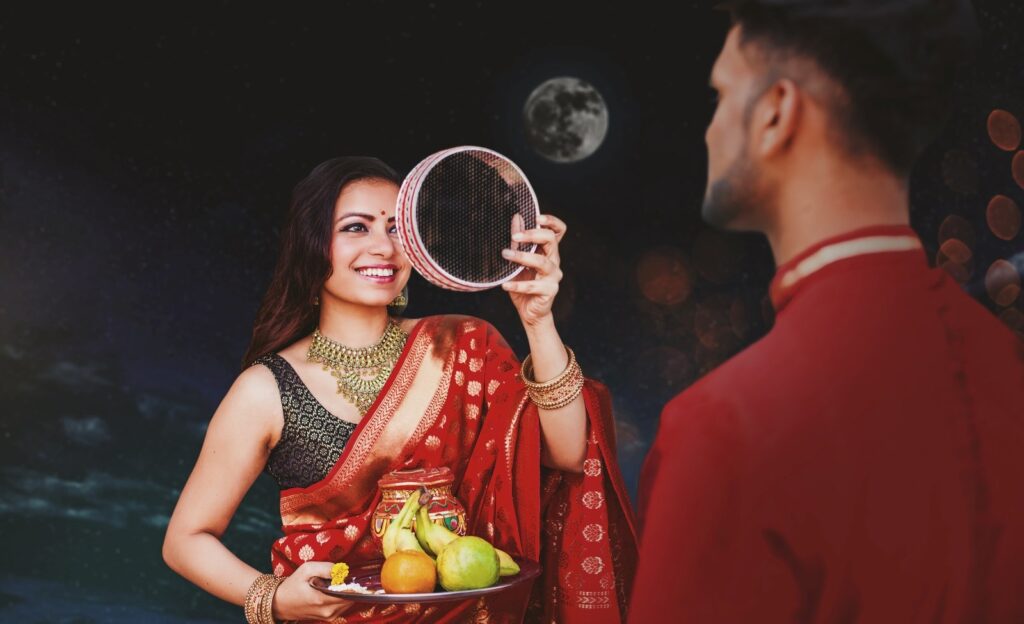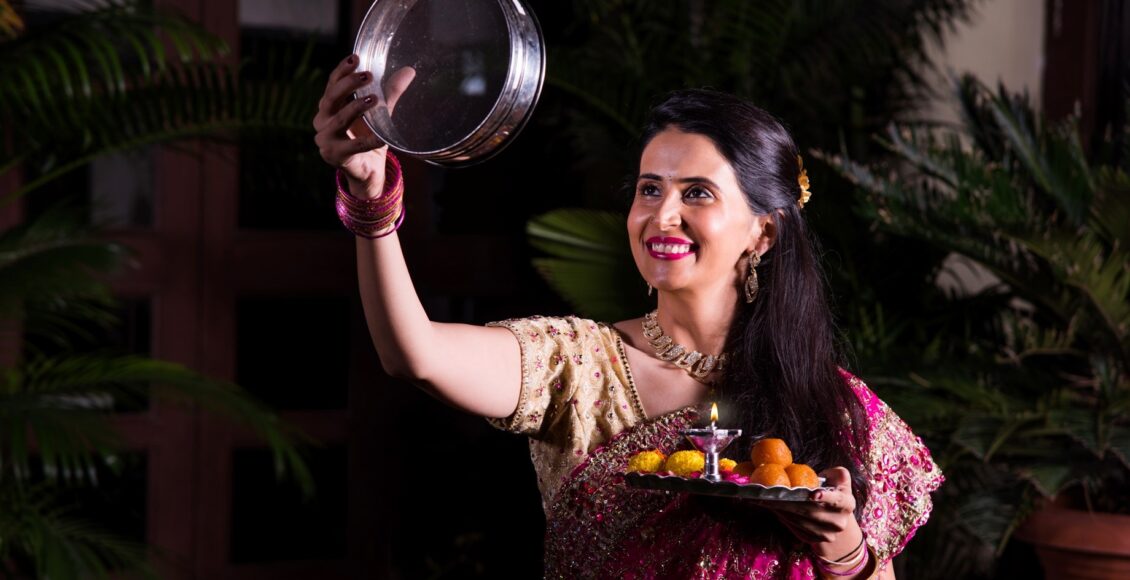Karwa Chauth – Selfless devotion of a Hindu woman
Karwa Chauth is a festival celebrated mainly in the northern parts of India. Women praying for the long life of their husbands celebrate this festival. They dress in their wedding finery, and eat absolutely nothing the whole day. They do not even take a sip of water, and break the fast only after sighting the moon, and their husband in the light of the moon. Karwa Chauth falls on the fourth day of the dark fortnight of the Hindu month Kartik (October or November). This is about nine days before Diwali.
Origin
Karwa Chauth is considered an important festival for a married woman in Hinduism. This festival celebrates the spirit of Pati-vrata – selfless devotion of a Hindu woman for her husband. It is believed that even the Gods cannot refuse a pati-vrata whatever she wishes. Even the god of death is powerless against her. This is illustrated in all the stories related to the festival.
According to one tradition the festival is named in honor of the woman who first performed the fast. According to this story, there once lived a woman named Karwa with her husband in a small village. She loved him and was devoted to him, and took care of all his needs. One day, her husband went to the river, and was caught by a crocodile. He called out to his wife, who ran to the scene and bound the crocodile with a cotton thread. She was a Pati-vrata – a truly devoted wife. She summoned the god of Death, Yamraj, and asked him to take the crocodile and leave her husband alone. Yamraj demurred, telling her that it was part of his duty, but Karwa threatened to destroy him with the power of her devotion to her husband. Yamraj had no choice but to relent, blessing her husband with a long life. Since then, when women fast on this day, they pray to Karwa, asking her for the strength and determination to protect their husbands, the way she had protected hers.
The other prominent story related to Karwa Chauth is that of a princess named Veeravati. This story is read out during the festival to emphasize the importance of fasting conscientiously. Veeravati was a delicate princess, the darling of her seven brothers. Married to a king, she returned to her maternal home for her first Karva Chauth, and started fasting. Being delicate, and unused to the rigors of fasting, she was almost on the verge of collapsing. Her loving brothers could not bear the pain of their sister and decided to trick her into the fast. They shone a mirror through the leaves of a tree, and convinced her that the moon had risen. The simple princess believed them and broke her fast. Just then, they received news that her husband was dead!
The princess was inconsolable and rushed to her home, where she learned that the moon had not yet risen, and that she had unknowingly broken her fast before the appointed time. Her grief knew no bounds when she realized her error, even more so, since her beloved brothers were responsible for it. Her genuine anguish drew the compassion of Goddess Parvati, who appeared before her and agreed to reduce her pain, by bringing her husband back to life. However, he would be seriously ill, and would be cured only when the princess performed the Karva Chauth Vrat diligently the next year. The princess was happy to agree to the condition and cared well for her husband for a whole year. At the next Karwa Chauth, she fasted and completed the vrat, breaking it only after sighting the moon and taking the first bite from her husband. Immediately, her husband was restored to his former healthy self.
Celebration
Women start preparing for this festival, days, even months in advance, buying new clothes, jewelry and accessories to make themselves look beautiful. Sargi also has a special significance on this day. Women and girls who fast on this day wake up before sunrise and eat sargi after bathing. Sargi is usually prepared by mother-in-law. Dry fruits, coconut, fruits and sweets are eaten in the sargi. The girls who are observing the fast of Karva Chauth before their wedding, are given sargi a day before by their going to be mother-in-law . Sargi is eaten before the sun rises in the morning so that energy remains throughout the day. On the day of the fast, they prepare food and have it before sunrise. They apply henna on their hands and dress in their wedding finery, and spend the day fasting and listening to the stories of married women who defied death by their devotion and love for their husbands.

At moon-rise, women get together and meet on the terrace from where they can see the moon. They stand facing their husbands and lift their eyes to the moon, using a sieve, to filter out its negative aspects. They then lower their eyes and see their husbands through the same sieve, again choosing to see only the good, and then receive a morsel of food, usually a sweet from the hands of their husband. The family then partakes of a feast together.
Women also exchange pots, called “karwas” among themselves. This pot is a decorated one, filled with sweets, auspicious items such as bangles, articles for adornment and a piece of cloth. The exchange of these pots varies from region to region. In some places, these pots are simply exchanged between women after they complete their fast, while in some places, the pots are repeatedly passed among the women, while songs related to the festival are being sung.
No matter how it is performed, the Karwa Chauth fast is one of the most important festivals for married women in India. Today, the festival has gained immense popularity and some of the modern husbands too fast on the day along with their wife! Such is the beauty of this festival.


Comments are closed.